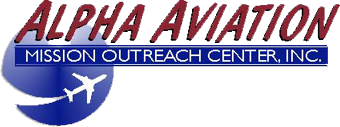Do you have what it takes to be a missionary pilot?
TO BECOME A MISSIONARY PILOT…
 First and foremost, a missionary pilot is a missionary! That means that one must be sure of his or her personal relationship with Christ, and be a growing, maturing Christian. The call of the missionary is to share the Good News of Jesus the Savior, and we cannot give what we do not possess! Because the missionary pilot will literally be on the “front line” of spiritual warfare, there must be a measure of spiritual maturity and stability of Christian life. So, in your time of preparation, be active in your local church, growing in Christ!
First and foremost, a missionary pilot is a missionary! That means that one must be sure of his or her personal relationship with Christ, and be a growing, maturing Christian. The call of the missionary is to share the Good News of Jesus the Savior, and we cannot give what we do not possess! Because the missionary pilot will literally be on the “front line” of spiritual warfare, there must be a measure of spiritual maturity and stability of Christian life. So, in your time of preparation, be active in your local church, growing in Christ!
Secondly, one who aspires to mission work must be a student of God’s Word. The better equipped soldier is always in a position of advantage on the battlefield, and this is true in spiritual warfare as well. Time spent in the study of God’s Word is of primary importance, and most mission agencies require a minimum of one year credit at the Bible school/college level. The missionary pilot, even if not engaged in direct teaching/preaching ministry, will often find opportunities to share and teach concerning the faith. And, the mission pilot is often involved in a ministry of encouragement to other mission personnel. To know God’s Word is as important to the mission pilot as piloting skills!
Thirdly, a high level of technical competence is needed. Merely “having the ratings” as a pilot is not enough! A missionary pilot needs more than just average piloting skills. Minimum requirements are to have a commercial pilot license with an instrument rating. Some missions will require a multi-engine rating, and even though tailwheel aircraft are less common than they were, the experience gained is a help to every pilot. Most mission agencies also require a minimum pilot experience level, usually in the 500-hour range, prior to beginning their specific training program. Because many pilots serve in remote areas, an aircraft mechanic’s license is often required in addition to the pilot certifications. The more diverse the training and experience a pilot receives, the more valuable the mission pilot’s contribution to the ministry. A program of aviation training that is mission-specific is helpful on several levels. It helps to have the counsel of those familiar with mission work, which does differ from commercial aviation. And, training in a Christian environment, learning from spiritual as well as technical mentors, helps to prepare you for a life of service. Strive for excellence and diversity as you build your skills!
Fourthly, “collateral skills” are important to the mission pilot. Beyond being a pilot and mechanic, the mission pilot may find need for computer skills, radio communications and electronics skills, general mechanic and “handyman” abilities, some background in emergency medicine, and a willingness to learn other new skills as needed! A missionary pilot does not merely have a job, he has a call…a call to serve, that comes directly from the Lord. Thinking of your calling as a “job” is a serious mistake, one that is unfortunately all too common. This leads to burn-out and disillusionment, and a failure of the ministry. Openness to be used as God sees fit, whether that meets with our expectations or not, is the key to success in missions work.
Finally, those who aspire to mission work must be ready and willing to live sacrificially. Jesus is our example, and the lives of His apostles also exemplify the missionary call. You may be called upon to give up a life of plenty for a life of austerity…you may be called to put off marriage and family…you may even be called upon to lay down your life for the cause of Christ. One thing is certain, if you go into mission work with the idea that it will be a life of ease, you will certainly be disappointed! But, if you go in with the idea that you will experience fulfillment walking with the Lord, you will NOT be disappointed! As you consider preparing for service as a mission pilot, begin today to be a missionary! Every believer has a calling to share Christ, and if we are unable or unwilling to do so at home, it is unlikely we will be more successful at it overseas. Be faithful where God has you today, and He will lead you in the future as well. Begin by praying and being prayed for by a group of believers…get your church involved in praying with and for you! Be wise in financial matters, for the missionary pilot faces a double dilemma in that area: you need expensive training as a pilot, and you need to accomplish it without indebtedness, as most missions will not consider you if you have a load of debt. God’s call is always confirmed by God’s people, so listen to the counsel of Christian brothers and sisters as you seek His will. There is much to consider in this calling, many obstacles to overcome. But, if God is indeed calling you to service in mission aviation, He will provide!
If you are interested in becoming a missionary pilot & mechanic, you will need to meet a set of criteria. Aviation training and education is necessary and quite expensive. Those with significant debt will be challenged to qualify for the field. Let’s take a look at what is required to become a missionary pilot or mechanic.
Training Requirements
In terms of training, mission organizations require that even the most experienced pilots partake in orientation and training sessions. The national aviation authority of the host country is required to certify all missionary personnel. Pilots must be certified and able to overcome any potential language barriers. While English is used by most aviation authorities and personnel, there are situations where missionary pilots must speak a language aside from English. Pilots will carry mail and supplies, so they should be able to speak cordially with locals. They also must raise their own financial support as they will not be paid during their mission.
While there is no preferred way to obtain training, missionary-specific schools commonly rely on instructors from missionary groups with field experience. When students are able to interact with missionaries, they tend to become more motivated throughout their years of training. Some universities offer degrees upon graduation yet this route is typically expensive. Certain technical schools and community colleges also offer a degree that is usually cheaper than the cost of a university degree. Missionary pilots must carefully decide if the expense of a degree is worth the money, time and work. Some individuals know a friend who has an airplane and is willing to let it be used for missionary training purposes. Others choose to purchase and maintain a relatively cheap airplane that they can use for training and sell upon completion. The bottom line is that aviation is not cheap and can’t be done quickly. On average, it takes the average missionary pilot about a decade of education, experience and training before he is permitted to enter the field.
Alpha Aviation Mission Outreach Center Inc Shows the Way for Training Requirements
AAMOC is a Christian humanitarian aviation operation and is a great guide for training requirements to become a missionary pilot or mechanic.
The minimum requirements to be considered as a fixed-wing AAMOC pilot are these: commercial pilot certificate with instrument rating and 500 hours of total time; 50 hours of high-performance time; airframe and powerplant (A&P) certificate. CFIs who have good tailwheel experience are especially valuable candidates.
Why the A&P? When your engine hiccups in the jungle, placing a cell call to the local FBO mechanic for help is not an option.
But, wait–there are other requisites that you will not see for ordinary aviation employment because this is not an ordinary career. It’s a service to both mankind and that higher authority. The process is rigorous and is not for the faint of heart.
Primary requirements: Quite detailed, but best described as a dedicated member of the Christian community and active subscriber to its religious principles.
Preparation and training: Completion of AAMOC’s nontechnical and technical requirements (nontechnical requirements apply to both applicant and spouse).
Application: Formal applications are sent, upon request, to persons who currently fulfill, or are in the final phases of fulfilling, AAMOC’s minimum requirements. If approved, the applicant receives a formal invitation to technical candidacy. Included with the formal invitation are medical examination forms and psychological tests to be completed and returned prior to technical candidacy.
Technical candidacy: Technical candidacy is at the applicant’s expense except for housing. Pilot/mechanics spend one week in flight evaluation (seven to 10 hours in a Cessna 172) and one week of maintenance evaluation.
Non-technical candidacy: A two-week session at AAMOC’s headquarters. Candidate families are introduced to the operation, mission, and philosophy of AAMOC. During this stage successful candidates are accepted into membership and field assignments made.
Fast track: New AAMOC families seek out ministry partners–friends, family, and churches that provide both spiritual and financial support.
Orientation: For pilots/mechanics, 10 weeks of additional preparatory training.
Language school: Approximately six months to one year is spent in concentrated language study outside the United States.
Field orientation: A minimum of six months of supervised, on-location flight maintenance training and cultural adjustment.
Mission career: The normal AAMOC term of service consists of three and one-half years on the field followed by six months of furlough in your home country.
Now, the big question. What about pay? The answer is best put forth by Paul Lay, a former flier who spent six years in MAF service. “Being a AAMOC pilot is flying on the front lines of war against isolation, poverty, and darkness: it’s giving people–men, women, and children–who have no chance, a second chance. AAMOC pilots don’t pull down the pay of a lot of professional pilots, but they’re the richest fliers I know.”
If you want more information, surf over to AAMOC’s Web site.
Debt Considerations
If at all possible, try to avoid debt before you enter into aviation training. There are ample opportunities for scholarships through many organizations both academic and program-specific. However, if you find yourself burdened with student loan debt, one option to consider is income based repayment (IBR). IBR is a program in which federal student loans are paid back according to one’s income level. Alternatively, if the loans are not egregiously large, you can include them in your mission budget. Use loan amortization programs to calculate a loan payment schedule. Once you determine how much you have to pay per month and for how long, you will have a better idea of whether you are in a financial position to become a missionary pilot or mechanic. However, those with little or no student loan debt will be in prime position to serve in missions. Ideally, you will be able to pay off your student loan debt in full before you leave for the field. Do not feel any guilt if others are willing to pay your student loans to liberate you for your mission. Certain mission agencies like WEC International make provisions for student loans. If you can provide a letter to WEC that states that a supporting person or organization is willing to pay down your student loans while you are with the organization, the debt will be ignored.
If you have credit card debt, you will not qualify to become a missionary pilot or mechanic. Those who have a home mortgage must be able to coordinate the assistance of a property manager who will rent out the home to a tenant while they serve as a missionary pilot or mechanic. This way, there will be a consistent stream of income to pay the home mortgage and prevent all of the problems associated with a default.

